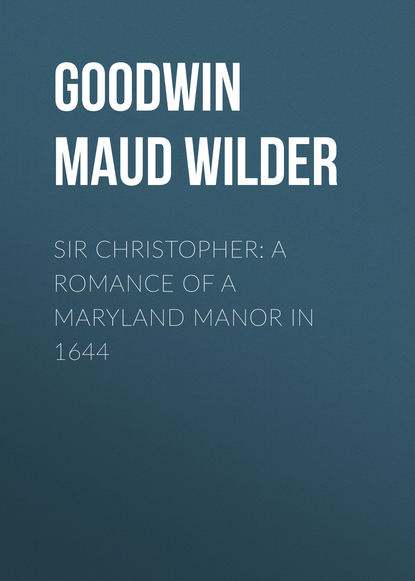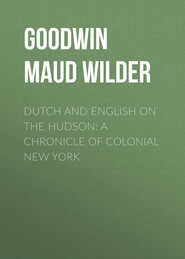По всем вопросам обращайтесь на: info@litportal.ru
(©) 2003-2024.
✖
Sir Christopher: A Romance of a Maryland Manor in 1644
Настройки чтения
Размер шрифта
Высота строк
Поля
Thereafter Father White turned again to the subject of missions, and the two women listened till the hour-glass had been turned and the candles began to burn low in their sockets. At last Mary Brent grew somewhat impatient. If she had a vice it was excess of punctuality. She was willing to share her last crust with a stranger; but he must be on hand when it came out of the oven. The hours for meals and especially for bedtime were scrupulously observed in her household, and to-night it irked her to be kept up thus beyond her usual hour for retiring.
Elinor, perceiving this and feeling some sense of responsibility for the cause, said at last, —
"I pray thee, Cousin, wait no longer the coming of Sir Christopher, whose errand has kept him beyond what I counted on, else I would not have given my consent. Father White and I will sit up to await his coming. Go thou to bed, and see that the counterpane is drawn high over Cecil, for the howling of the wind promises a cold night."
"Poor little one!" said Mary Brent, rising and evidently glad of an excuse for retiring, "I will see that he is tucked in warm and snug. Sir Christopher is to sleep next Father White. I have had his bed made with our new homespun sheets."
As Mistress Brent passed out of sight up the stairs, Elinor turned to Father White with tears standing in her eyes, —
"How good she is!" she murmured.
"Ay, a good woman – her price is above rubies. I pray that by her example and influence you may be held as true as she to your duties to God and His Holy Church."
Elinor stirred uneasily. The movement did not escape the priest's eye, accustomed to studying every symptom of the soul's troubles as a physician studies the signs of bodily tribulations.
"My daughter," he continued, "is your heart wholly at peace – firmly stayed upon the living rock?"
"No! no!" cried Elinor, "it is rather a boat tossed upon the waves at the mercy of every tempest that sweeps the waters."
"How strange!" said Father White, speaking softly as to a suffering child. "How strange that you thus of your own will are tossed about, and run the risk of being cast upon the rocks; yea, of perishing utterly in the whirlwind, when peace is waiting for you, to be had for the asking."
"I would I knew how to find it."
"Even as St. Peter found it when he too was in peril of deep waters, by calling upon the name of the Lord. Come, my daughter, come with me to the altar, that we may seek it together!"
Taking a candle from the table he rose and led the way to the recess at the end of the hall, which Mary Brent had piously fitted up as a chapel, where before the altar burned the undying lamp of devotion.
"Here," said the priest, "peace awaits the storm-tossed soul. It shall be thine. But first must thou throw overboard all sinful desires, all guilty memories, all selfish wishes, and seek in simplicity of heart that peace of God which passeth understanding. Kneel, my daughter, at the confessional!"
So saying he seated himself in the great oaken chair, brought out of England. Elinor fell upon her knees beside it and poured out the grief and struggles of her tumultuous soul.
"Bless me, Father, because I have sinned." The voice trembled at first so that the words could scarcely be heard, but grew firmer as she went on in the familiar words: "I confess to Almighty God, to blessed Mary ever Virgin, to Michael the archangel, to blessed John the Baptist, to the holy apostles Peter and Paul, to all the saints, and to you, Father, that I have sinned exceedingly in thought, word, and deed, through my fault, through my fault, through my most grievous fault."
"Mea culpa, mea culpa, mea maxima culpa!" How the words ring down the ages laden with their burden of human penitence and remorse! Still, despite all the uses to which they have been wrested by hypocrisy and levity, they remain infinitely touching in the link they furnish, the bond of unity for the suffering, sin-laden souls of many races and many generations.
When Elinor had finished the list of offences whereof she wished to free her soul, and which even to the sensitive conscience of Father White appeared over trivial for the emotion she had shown, the priest asked softly: "Is there nothing else? Examine well thine heart. Leave no dark sin untold to grow in the shadow and choke the fair flower of repentance."
"No, Father, I know of no other sin."
"Nor any unworthy wish?"
"Nor any unworthy wish."
"Nor any carnal affection threatening to draw thy soul away from the path of salvation?"
The shaft was shrewdly aimed. It struck home.
"Father, is it a sin to love?"
"It may be – a deadly sin."
"To love purely, with a high and unselfish devotion?"
"It may be."
"Prithee, tell me how, since God himself is love."
"There is indeed a Godlike love, stooping to the weakest, bending over the lowest, yearning most over the most unworthy, such as the love of the shepherd for his sheep, of the mother for her son, of the true priest for his flock; but let a woman beware how she brings to the altar such a love for her husband."
Elinor started.
"Yes," Father White went on tenderly, but as one who must probe the wound that it may heal the sooner, "it is the nature of woman to look up. She will do it, and if she cannot raise the one she loves she will stoop to the dust herself, that from that abasement the man may still seem to stand above her."
"Father," cried Elinor, casting aside all concealment, "the man I love is not base."
"Do I know him?"
"You have seen him."
"This night?"
"This night."
"Can a man who knoweth not how to rule his own tongue rule a wife, and above all a wife like thee, aflame one instant, the next melted to tenderness, full of pity and long-suffering, yet quick of spirit and proud as Lucifer?"
Elinor was silent.
"A captious temper is a grievous fault, yet it may be mended – if he is of the true faith. But, oh, my daughter, tempt not thy fate by marrying an unbeliever! Faults thou mayst conquer; sins thou mayst forgive or win forgiveness for; but unbelief is a blight which fosters every vice and destroys every virtue. Root up this passion, though it seem to tear thy life with it. Think on thy boy! Durst thou expose him to the influence of such an example?"
"Father," said Elinor, tremulously, "I cannot answer now – I must have time to think. Who knows but my love may draw him into the right path?"
The priest shook his head; but as he was about to answer, the stamping of feet was heard outside, and Father White dismissed his penitent with a wave of his hand.
"Go, my daughter. But as thou dost value thy soul and the soul of thy boy, entangle thyself no further till thou hast taken counsel once more with me. And may Almighty God be merciful unto thee, and, forgiving thee thy sins, bring thee to life everlasting!"
Elinor rose from her knees, and drawing aside the curtain passed out into the hall, while Father White tarried for the candles.
Neville came in at the outer door, bringing with him a gust of wind and cold. Knut rose from the hearth with a low growl and moved suspiciously toward the stranger, then, drawn by some magnetic attraction, he nosed about him and at last fawned upon him and rubbed against his legs, seeking a caress. Neville bent over and patted his head. "Good dog!" he said, "I would I had had you with me in the forest yonder. Belike I had not been so long in finding my way out. Ah, Mistress Calvert," he added, peering into the shadow from which gleamed the shimmer of Elinor's gown, "I am grieved to have kept the household awake so late, and all for naught, since I failed as completely in the search for Father Mohl as though he had vanished like a spirit in the air."
"Yet of old you were a swift runner. I have seen you chase a hare across the fields at Frome and keep the pace."
"Ay, but that was over Somerset turf, and with the light of day to guide me."
"I am much disappointed – "
Neville felt the chill in Elinor's tone.
"Not more disappointed than I," he answered. "'Tis the elements must bear the blame. When I started out the moonlight shone full on the path, and I could see my way for a quarter of a mile, but even then the clouds were hanging round the moon like wolves about a sheep-fold. In half an hour she was swallowed up, and then, to confuse me the more, a light snow began falling, slowly at first, then faster and faster, till, what with the wind in my face and the snow on the path, I lost the trail somewhere near the cross-road. Before I knew it I was caught in a thicket of brush and briar, and when I had struggled out there was no hope of catching the priest."






